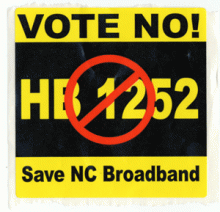Time Warner Reverses Direction in NC, Fights Competition with New Strategy
Time Warner, AT&T, and other incumbents have radically changed their strategy to prevent broadband competition in North Carolina via new restrictions that are being debated in the Legislature currently. This switch in strategy offers more proof that they stand on no principle aside from protecting their monopoly.
The famous HB 1252 in North Carolina is back... but different. In the past, the telcos and cablecos have argued that municipal broadband networks are unfair to them because the city could use tax dollars in some way to build the network (ignoring that most publicly owned networks do not use any tax dollars). Now, these companies are pushing a bill to require financing backed by taxpayer dollars. Seems like an odd switcheroo.
As one might expect from companies like AT&T and Time Warner, who have no respect for the public process, the bill was kept top secret until debated in committee, giving only the side filled with monied interests and lawyers an opportunity to prepare. The bill (that we have made available here as there is no official version yet) would not just place significant restrictions on new publicly owned networks, but would also handcuff existing networks like Salisbury and Greenlight in Wilson.
To reiterate, this bill will damage the most advanced broadband networks available in North Carolina today. Sounds like North Carolina wants to take up Mayor Joey Durel in Lafayette on his offer to welcome the businesses moving from North Carolina to Lafayette with a big pot of gumbo.
Fascinating that after an FCC Commissioner noted that the US Broadband Plan recognizes the right for communities to build their own broadband infrastructure, North Carolina is deciding it prefers to preclude any broadband competition, sticking with its last-century DSL and cable. Just fascinating.
The Salisbury Post has been watching and recently published a scathing editorial against the bill. This is one paragraph, but the whole editorial is well worth reading.
Yet, if the HB 1252's intent becomes reality, such areas will be severely hobbled in their near-term ability to tap into the broadband revolution.


